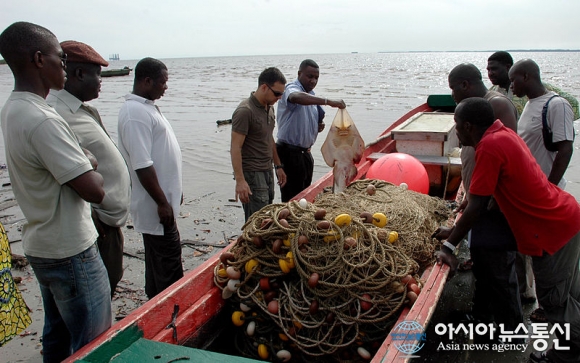 |
| Photo by: U.S. Navy photo by Mass Communication Specialist 2nd Class David Holmes |
Fish, finance and Trump: What to expect at the UN Ocean Conference
By Amy Lieberman amylieberman 05 June 2017
Peter Thomson (center), president of the 71st session of the United Nations General Assembly, briefs journalists on the World Ocean Conference taking place at the U.N.headquarters starting June 5.He is flanked by Wu Hongbo (left), under-secretary-general for economic and social affairs, and Damian Cardona (right), chief of the communications campaign service from the Department of Public Information.Photo by: Eskinder Debebe / U.N.
The stakes are high for the first high-level world Ocean Conference at the United Nations headquarters in New York which kicks off on Monday, and runs all week.
The conference, which will draw more than 5,000 participants, including eight heads of state, seven prime ministers and 77 ministers, and feature more than 150 side events, comes shortly after the United States announced its intentions to withdraw from the Paris Agreement on climate change.
Government representatives, civil society groups, scientists and other experts will convene this week to address the profound consequences of climate change, pollution, overfishing and other human-caused impacts on the oceans, which cover more than 70 percent of the Earth’s surface.It will also be an exercise in formulating key actions that can help conserve oceans and marine resources — and meet the targets of U.N.Sustainable Development Goal 14, which aims to significantly prevent and reduce marine pollution by 2025, address ocean acidification and lend access for small-scale fishers to marine resources and markets, among other goals.
The timing of the conference, which has been in the works for two years, comes at a moment when climate change is creating global headlines thanks to Trump’s decision on withdrawal from the Paris Agreement.The widespread anger — from scientists and politicians, to environmental groups and businesses leaders — that has been expressed internationally will only add fuel to the urgency and high profile of the week-long discussions.
The U.S., now led by a head of state whose executive and communications team has questioned the science backing climate change and its connection to the Paris Agreement, is reportedly planning to stand against the global warming “call to action” that will come out of the conference.
“The absence of the U.S.A.does not make the glass half full,” said Ronald Jumeau, the U.N.ambassador from Seychelles during a press briefing last week. “We are going to see increasing movement by countries trying to figure out how they can best use the oceans to tackle climate change.The Paris Agreement has been written, agreed [to], and that is what it is.”
Policy and financial commitments
So far, governments, the U.N., private sector organizations, other international and regional finance institutions, civil society and others have pledged more than 500 voluntary ocean-related commitments supporting some new and some existing work ahead of the conference.More than a third of these have been made by governments.For example, the Maldives is developing a community-based waste management system for waste separation, storage and small-scale recycling, and the Norwegian Shipowners’ Association has collected data on the ocean subsurface to benefit research on ocean developments and its temperature and weather conditions.
“We’re excited because, in the past, events like these have spurred action.If you look back at Secretary of State John Kerry’s Our Ocean conference last year, you see that countries don’t want to show up to these international ocean conservation events empty-handed.They usually have some exciting announcements lined up about what actions they are taking back home,” Susan Rockefeller, a board member for Oceana, the international ocean conservation and advocacy group, told Devex in an e-mail.
The number of commitments could double by the week’s end, Peter Thomson, president of the U.N.General Assembly, told reporters last week at the U.N.
“Ocean action and climate action are two sides of the same coin.They are inseparable,” he said.
Wu Hongbo, the under-secretary-general for the U.N.’s Department of Economic and Social Affairs, echoed his colleague and said: “There are a lot of challenges, [but] we do equally have good opportunities.”
Fisheries
Sustainable fisheries are one of the conference’s main themes, along with restoring coastal and marine ecosystems.
Climate change is severely damaging oceans as they have warmed and acidified over the past several decades and impacted weather patterns and marine environments.This includes the world’s fish supply, which as one of the world’s most traded food commodities, has experienced an overexploitation problem.This has cost the industry a potential $83 billion each year, the World Bank has found, and risked the food sources that about three billion people rely on as their primary protein.
Rockefeller explains why fisheries are now coming into focus at the U.N., calling them the “key to healthy oceans.”
“A lot of people believe that climate change is the chief driver of fish population decline — actually, it’s overfishing.That’s a good thing, though, because we know how to fix overfishing: Implement science-based fishing limits, protect key habitats that serve as nurseries, limit the unintentional capture or killing of marine species, and reduce pollution,” she wrote in an e-mail.
Fishing populations can recover.The Magnuson-Stevens Act, first passed by the U.S.in the 1970s, has led to the successful rebuilding of fish stocks since 2000, according to Oceana.The number of overfished stocks in the U.S.has been cut in half in that same timeframe.
“Fisheries management has really come into focus because it is those same measures we take to manage fish effectively — protecting habitat, limiting pollution, preventing bycatch — also help protect ocean biodiversity.Putting more fish in the sea helps feed people around the world but also serves as the bedrock of a healthy, vibrant ocean ecosystem,” she wrote.

